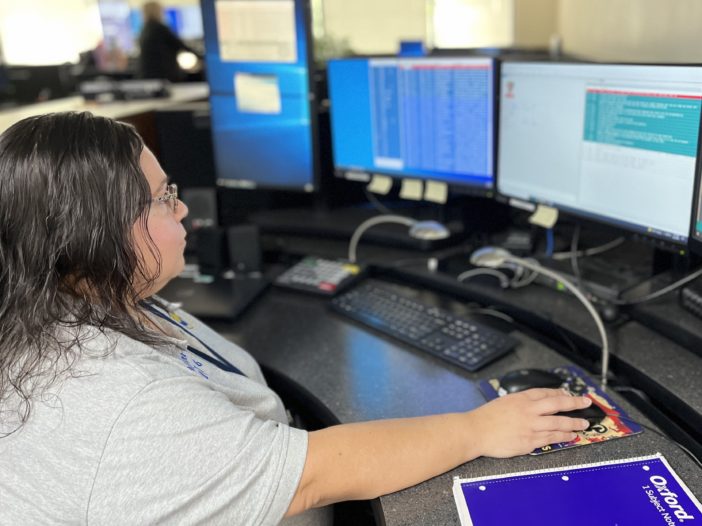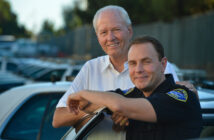The phones at Bakersfield Police Department’s communications center urgently ring throughout the day with emergency calls ranging from welfare checks to neighborhood disturbances. Dispatchers are trained to keep calm, take the information, send police, and move on to the next ringing line as quickly as possible.
But for newcomer Delphina Rojo, her position as a recovery specialist gives her a special set of skills to field 9-1-1 calls for residents who may need mental health services. Rojo’s job is to keep them on the line so she can find out how she can help them.
Rojo, tucked away in her cubicle with a multiline phone and a massive computer screen, isn’t considered a Bakersfield Police Department dispatcher – she’s her own entity.
She has the ability to stay on the phone as long as a caller needs, she provides resources and phone numbers for everything from rehabilitation centers to shelters to mental health providers. She has a list of callers she likes to follow up with and make sure they are making strides toward improvement, and more often than not, Rojo can be heard asking people on the phone, “How does that make you feel?”
“Somebody calls 9-1-1 and they say they are having a panic attack and are having difficulty breathing. Most people call 9-1-1 because it’s what we were taught since we were children,” Rojo explains. “Dispatch transfers the call to me by saying ‘let me transfer you to our mental health specialist’ and I will talk to the individual … alleviating the panic attack and give them the resources they need to help them long-term.”
The pilot program, in collaboration with Kern County Behavioral Health and Recovery Services, launched in June 2021 and Rojo began her position in August as the department’s inaugural risk specialist. In the last year, the program has taken off and the Bakersfield City Council approved funding for two more mental health specialists who will answer phones alongside dispatchers.
Rojo currently works from 2 p.m. to 12 a.m. Wednesday through Saturday, and she often starts her shift by checking on messages left for her or reviewing notes from her colleagues who flag calls for her to follow up on.
“We absolutely love this new program,” said Tamia Smith, Communications Manager at Bakersfield Police Department. “We are looking forward to having it staffed 24 hours a day with clinicians because it has been so well received. Our dispatchers are happy to have someone who can better handle these types of calls. We don’t have the manpower, the time commitment, or the resources Delphina does. Our dispatchers don’t have 30 minutes to build the rapport and trust needed. When you are speaking with someone in mental crisis you don’t want to rush them.”
According to Smith, the department began to research filling this role after a field trip to the Los Angeles County Sheriff’s Department, which has a similar program. They also gleaned information from the City of Eugene, which has had its program CAHOOTS (Crisis Assistance Helping Out on The Streets) in place for 30 years.
Bakersfield Police Department also has an IMPACT team that merges police officers with community partners and nonprofits to focus on aiding the homeless population and quality of life for Bakersfield residents.
The new position at the Communications Center is another aspect of the City’s mental health toolkit, as officials look to focus on outreach and decrease law enforcement’s contact with individuals who are better served by mental health professionals.
In the last several years, Bakersfield Police Department has put a spotlight on the importance of mind-body-soul wellness for the community, and for all police department employees. They’ve implemented a number of in-house programs, including offering the wellness app Cordico, which is an on-demand one-stop shop for wellness. The app includes videos, articles, self-assessments, and guides created specifically for those in high-stress occupations.
Rojo came to this position with about 18 years of experience working in the mental health field. She earned a degree in criminal justice, and later became interested in social work.
“I worked on the MET team (a Kern County program), it was a mobile crisis team for the city, and we responded with police officers. Sometimes I was at someone’s home and sometimes I was talking someone down off a bridge,” Rojo said. “I really enjoy this work; I enjoy helping people get through recovery and helping them with their mental health and showing them how it can improve their environment.”
 Behind the Badge
Behind the Badge



